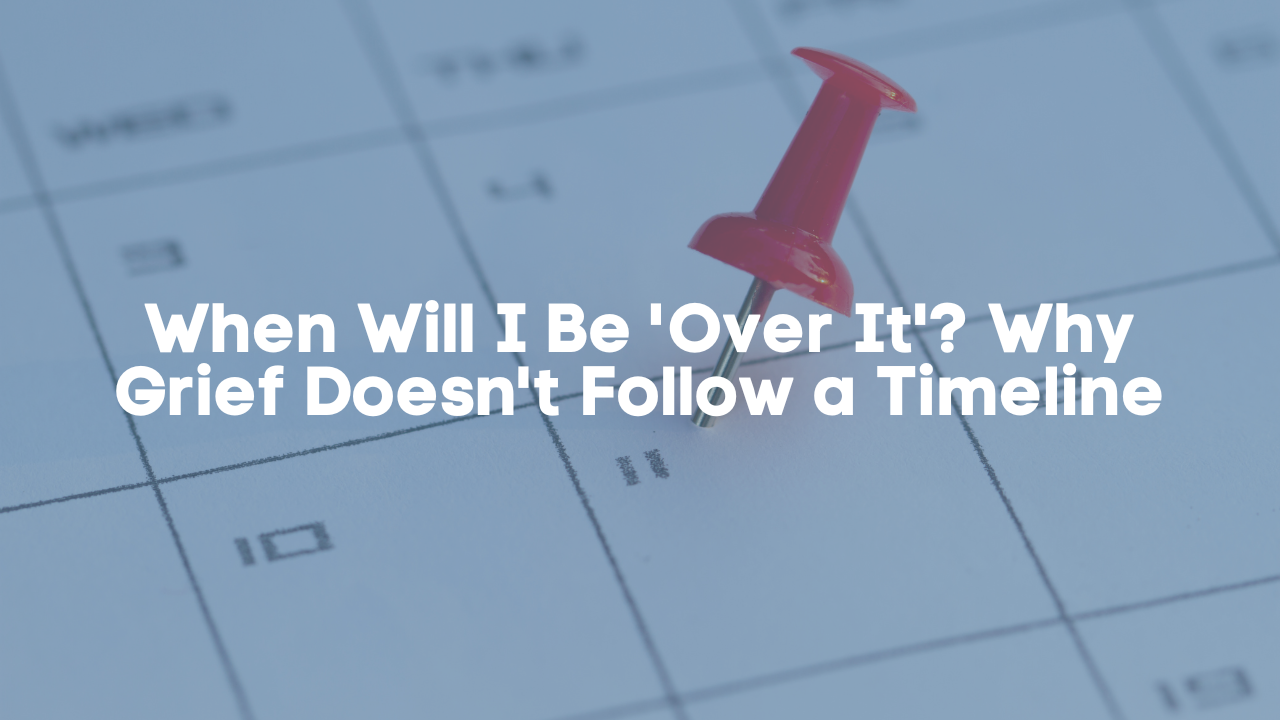When Will I Be 'Over It'? Why Grief Doesn't Follow a Timeline
Apr 13, 2025
When was the last time someone asked you, "Aren't you over that by now?"
Maybe it's been months since the hurricane destroyed your town. Years since your divorce was finalized. Decades since you lost your mom. And somehow, people expect you to be "done" grieving, as if grief comes with an expiration date stamped on the bottom like a carton of milk.
Society has some weird expectations about grief timelines. We're allowed a few days off work when someone dies. Maybe a couple of weeks to be visibly sad. Then it's time to "move on," "find closure," and all those other phrases people toss around when they're uncomfortable with your grief.
But here's the truth: Grief doesn't care about your calendar.
Your grief will show up exactly when it wants to. On birthdays and anniversaries, sure. But also on random Tuesday afternoons when a song plays in the grocery store. Or when you smell your ex's cologne on a stranger. Or when you drive past the hospital where you got that diagnosis. Or when the holidays roll around, and you're still figuring out new traditions.
And you know what? That's completely normal.
There's this myth that grief should follow a neat, predictable pattern. That it should get a little better every day, like a steadily healing wound. But anyone who's actually grieved knows that's far from the truth.
Some days you feel fine – maybe even guilty about feeling fine. Other days you're flattened by a wave of grief so intense it takes your breath away. And this can happen two years, five years, twenty years after your loss.
Here's what's really going on when grief sticks around:
- Your brain is rewiring itself around the absence of someone or something that mattered deeply to you. That's not a quick process.
- The relationship didn't end – it transformed. You're learning how to continue loving someone who isn't physically present, or processing a connection that changed form.
- Your grief evolves as you do. The way you understand your loss at 25 might be completely different from how you see it at 35 or 55.
- Grief isn't just sadness – it's a complex mix of anger, relief, longing, gratitude, and a dozen other emotions that don't resolve neatly or quickly.
So what does a more realistic approach to grief timelines look like?
First, throw out the measuring stick. Seriously. There's no "should" here. You're not behind schedule if you're still crying three years later. You're not grieving wrong if certain days are still hard a decade later.
Second, remember that grief isn't something you "get over" – it's something you integrate. Your loss becomes part of your story, woven into who you are. Some days that thread is more visible than others, but it's always there.
Third, recognize that processing grief isn't linear – it's cyclical. You'll revisit the same feelings at different points in your life, sometimes with new understanding, sometimes with fresh pain.
And most importantly, find people who get it. People who won't check their watches while you talk about your loss, wondering when you'll finally be "over it."
–
We're really serious about this no-timeline thing. Here's one thing we're doing about it:
If you're in Western North Carolina and still processing the aftermath of Hurricane Helene, we see you. The news cycle may have moved on, but your grief hasn't – and neither have we.
Join us for a special Meet & Grieve: Showing Love To Hurricane Helene First Responders on May 18th at New Belgium Brewing's Riverview Deck. This judgment-free gathering is specifically for first responders, frontline workers, mental health practitioners, and anyone supporting communities through storm recovery.
Because we understand that grief doesn't follow a timeline, especially when you've been busy taking care of everyone else. The first 25 attendees will receive a complimentary drink, and local food trucks will be on-site. Whether you want to share your experience or just be in a space where others get it, this is for you.
Register here
Remember: Your grief belongs to you, not to a calendar.
Join the Grieve Leave movement
Share your info to join our Grieve Leave community. You don’t want to miss anything!


